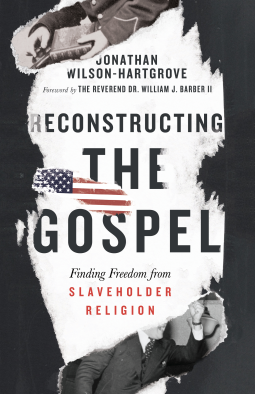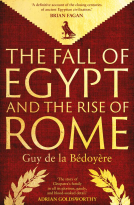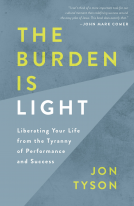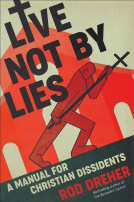
Reconstructing the Gospel
Finding Freedom from Slaveholder Religion
by Jonathan Wilson-Hartgrove
This title was previously available on NetGalley and is now archived.
Send NetGalley books directly to your Kindle or Kindle app
1
To read on a Kindle or Kindle app, please add kindle@netgalley.com as an approved email address to receive files in your Amazon account. Click here for step-by-step instructions.
2
Also find your Kindle email address within your Amazon account, and enter it here.
Pub Date Mar 13 2018 | Archive Date May 02 2018
Talking about this book? Use #ReconstructingTheGospel #NetGalley. More hashtag tips!
Description
"I am a man torn in two. And the gospel I inherited is divided."
Jonathan Wilson-Hartgrove grew up in the Bible Belt in the American South as a faithful church-going Christian. But he gradually came to realize that the gospel his Christianity proclaimed was not good news for everybody. The same Christianity that sang, "Amazing grace, how sweet the sound" also perpetuated racial injustice and white supremacy in the name of Jesus. His Christianity, he discovered, was the religion of the slaveholder.
Just as Reconstruction after the Civil War worked to repair a desperately broken society, our compromised Christianity requires a spiritual reconstruction that undoes the injustices of the past. Wilson-Hartgrove traces his journey from the religion of the slaveholder to the Christianity of Christ. Reconstructing the gospel requires facing the pain of the past and present, from racial blindness to systemic abuses of power. Grappling seriously with troubling history and theology, Wilson-Hartgrove recovers the subversiveness of the gospel that sustained the church through centuries of slavery and oppression, from the civil rights era to the Black Lives Matter movement and beyond.
When the gospel is reconstructed, freedom rings both for individuals and for society as a whole. Discover how Jesus continues to save us from ourselves and each other, to repair the breach and heal our land.
Advance Praise
"So what happened to Christianity in America? This is the question my brother Jonathan faces head-on in this book. He follows this question to the heart of America's original sin, and he invites all of us to join him there and face another question: is our God greater than America's racism? This is a question we must answer, no matter the color of our skin. Slaveholder religion has infected every corner of the church in America—including the black church. We must never forget that there were enslaved people who accepted the theology fed to them on plantations."
- from the foreword by Dr. William J. Barber II
"This book contains the message I have been longing to hear for several years now. It is the book so many of us need to read."
- D. L. Mayfield, author of Assimilate or Go Home
"Jonathan is a moral prophet and spiritual physician for our time. In this timely book, with the precision of a heart surgeon, he exposes the sickness that has long-plagued American Christianity and infected our society and politics, revealing that none of us is untouched by the disease. With the credibility of his life lived in solidarity with systemically oppressed people, he resounds a clarion call to reform the way in which we live the gospel. This is a must-read for all Christians in America. You will be humbled, enlightened, and motivated to heal the ailing heart of our country and recover its soul."
- Phileena Heuertz, founding partner, Gravity, a Center for Contemplative Activism
"God has entrusted Jonathan Wilson-Hartgrove with a message—the gospel of Jesus Christ has been tragically defaced by American white supremacy and must be reconstructed. In this passionate, fast-paced book, Jonathan gives us a distinctively Christological, hopeful path toward faithful reconstruction. God is able! Even though we, in our structures of sin, often feel powerless to exorcise the demon of white racism, know that God’s will shall be done, and God’s reign will come because God’s purposes shall not be defeated. What an empowering, hopeful word Jonathan has for Christians, white and black."
- Will Willimon, professor of the practice of Christian ministry, author of Who Lynched Willie Earle? and Preaching to Confront Racism
"In this insightful, accessible volume readers are introduced to the original sin of racism in the United States, which was first and foremost an economic system to benefit the few at the expense of the many. Racism is woven into the fabric of American institutions, and it will require systemic change to bring about true reconciliation. ‘A gospel that doesn't confront racism is no gospel at all,’ writes Wilson-Hartgrove, for the work of the gospel is to heal that which is divided and to reconcile that which has been torn apart. This book is a must-read for the church."
- Elaine A. Heath, professor of Missional and Pastoral Theology, Duke Divinity School
"A poignant, compelling, and eye-opening journey that recognizes the racism in us, Christian churches today, and the implicit bias of the dominant culture. The blinders come off through stories, history, and creative biblical insight. We are left amazingly hopeful for ourselves and the church, with Jesus’ invitation to follow him to a whole new world."
- Mary Nelson, Executive Director Emeritus, Parliament of the World’s Religions
"This powerful and prophetic book should come with a warning label. It’s full of stories of ordinary folks working for racial justice, making you want to pull up a chair on the porch for a closer listen. But the stories pack a wallop of conviction, and you will not leave that porch unchanged."
- Jana Riess, author of Flunking Sainthood and coauthor of The Prayer Wheel
"It has become obvious to any who seriously study our sources that much of what we call Christianity in the West today is in radical discontinuity with our faith in its early centuries. Our spiritual healing now depends on corporately facing our past with hope, just as any individual must do in our personal journey to wholeness. Jonathan Wilson-Hartgrove is an honest, courageous, and compelling guide on this path of radical conversion."
- Richard Rohr, Center for Action and Contemplation, Albuquerque, New Mexico
"For a long time the justice conversation in much of the evangelical church has centered on acts of compassion or engaging causes that emerge to fight global injustice. Along the way, we have neglected to ask tough questions like, What was the flaw in our gospel that allowed generations of Christians in America to perpetuate injustice in this country while at the same time being devoutly evangelical? For anyone who cares about true biblical justice and is not afraid to ask difficult questions, Jonathan Wilson-Hargrove’s masterfully written reflections on his journey of being challenged and mentored by black Christians in America is essential. Reconstructing the Gospel shows that such a journey can help us better learn what the gospel really means and why, without it, we are at risk of continuing to perpetuate insufficient justice pursuits informed by a flawed or incomplete gospel. This is a must-read for anyone looking for a more robust, nuanced, and mature faith in the face of America’s complicated ongoing history of race and religion."
- Ken Wytsma, author of Pursuing Justice and The Myth of Equality
"This book offers a front row seat to Jonathan’s transformation out of a well-meaning religion marred by white supremacy to a faith that keeps him in the frontlines of the fight for racial justice. His journey will be an inspiration and a roadmap to Christians who desire to be faithful in our times."
- Tony T. R. Lin, managing director, Institute for Advanced Studies in Culture, University of Virginia
"The Bible is full of stories of God healing blindness. Reconstructing the Gospel is about how God heals a common form of blindness today—racial blindness. You may have it and not even know it, which is why you need this book. By helping you see life in full color, it can help you be saved from the shriveled-heart syndrome and set free from slaveholder religion and the religion of whiteness. This is a beautiful and challenging book for these times."
- Brian D. McLaren, author of The Great Spiritual Migration
"Reconstructing the Gospel is an honest reckoning with the mangled, slaveholding religion that continues to pass for the gospel in the United States. It is not self-righteous or accusatory. Instead, Jonathan Wilson-Hartgrove vulnerably grapples with his own ongoing repentance of white supremacy’s powerful grip. Ultimately, this book is an invitation into the river that has been flowing for centuries in this land, providing a past and present counterwitness to the vandalization of Jesus’s name. A necessary and timely gift to the church!"
- Drew Hart, assistant professor of theology at Messiah College, author of Trouble I’ve Seen
"Racism in American religion, especially in its most subtle forms, isn’t something we’ve had language for describing helpfully—until now. This is a masterful work, invaluable for coming to terms with the hidden wounds of racism and the awful lie that Jonathan Wilson-Hartgrove calls, Christianity of the slaveholder. Jonathan is a reflective soul, at home in his own skin, fully aware of the contradictions and struggles in his own heart. This transparency proves to be the perfect gift for the rest of us who have our own soul work to do in helping end whiteness as a religion."
- Peter W. Marty, publisher of The Christian Century
"I hope every Christian in America will read this book. Jonathan Wilson-Hartgrove exorcizes the demons of racism and white supremacy that have plagued the body of Christ for far too long. He points the way toward a Christianity that looks like Jesus again."
- Shane Claiborne, author, speaker, activist
Available Editions
| EDITION | Other Format |
| ISBN | 9780830845347 |
| PRICE | $22.00 (USD) |
Featured Reviews
 Alex P, Reviewer
Alex P, Reviewer
Jonathan Wilson-Hartgrove has created a piece both timely and thoughtful, a challenging affront to systemic racial attitudes. His background resonates with my own, and I feel a genuine sense of walking side by side through critical issues of humanity as I read.
Early on, Wilson-Hartgrove introduces the idea of Jesus healing the blind, paralleling that with the process many of us need to experience. It’s an easy line to draw from this idea to being “woke,” but the challenge goes beyond that. This is more than realizing that the world isn’t as you thought it was. It’s being able to claim the role you may have played in perpetuating the subversion of the gospel, whether on purpose or not. The issues of race and religion are real, division is something which should not be in our church. This is a mandate from our Savior, echoed in every page of this book.
The author has physically participated in the lives of “others” as he takes this journey himself. In that, we move from an academic discussion about race to a real person opening himself up to the experience of change. It’s honest at every turn, an open embrace to take part in the lives of those who share God’s image.
 Adam S, Reviewer
Adam S, Reviewer
Summary: “There is no way to preach the gospel without proclaiming that the unjust systems of this world must give way to the reign of a new King."
Over the past 15-20 years there has been increasing discussion about the meaning of the word ‘gospel’. At the top level most everyone can agree that the ‘Gospels’ are the four books that open the New Testament and the ‘Gospel’ is the message of Christianity. Gospel is derived from the Greek euangelion which means good news. Understanding what is, and is not, ‘the gospel’ matters, it isn’t just semantics.
I pushed back pretty hard against Matt Chandler’s The Explicit Gospel because he didn’t have an ending to what needed to be included in the gospel and while I affirm that we have to actually use words, the gospel does not require a belief in 7 day creation or male only understanding of the role of pastor to be the gospel.
Scot McKnight I think had a helpful corrective to the ‘gospel movement’ with King Jesus Gospel which refocuses the meaning of the gospel on Jesus Christ’s Lordship. NT Wright’s Simply Good News takes a similar approach focusing on Jesus as King and restorer.
But each of these authors batting around the term gospel seem to focus primarily on gospel as intellectual content. Allen Yeh in his chapter in Still Evangelical focuses the problem not on the meaning of the actual word gospel (or evangelical) but the bias toward orthodoxy without paying enough attention to orthodpraxy. This isn’t a new charge. Lesslie Newbigin in his 1986 Foolishness to the Greeks: The Gospel and Western Culture focuses on how the gospel has been rooted in the West in a particular view of culture and practice.
I could easily keep going on. I have 163 reviews at Bookwi.se that include the word gospel. The meaning of gospel or the focus of the gospel or the practice of the gospel matter because we believe that our Christianity matters. This is not a discussion that is going away and this is not a discussion that is solved by Johnathan Wilson-Hartgrove’s new book Reconstructing the Gospel: Finding Freedom from Slaveholder Religion.
Reconstructing the Gospel is playing on the title of the book The Third Reconstruction which Wilson-Hartgrove co-wrote with William Barber. Both of these books reference the historical period of Reconstruction which in popular historical understanding is a period of failed political intervention after the Civil War. Recent historians, like Eric Foner have been re-writing that popular understanding of Reconstruction for the past 20-30 years.
The Christian hiphop artist Propaganda created a firestorm with his song Precious Puritans in 2012. Propaganda suggested that something is missing from our gospel presentation when we point to historical Christian figures but miss the fact that many of these giants of the faith in the United States were slaveholders. Johnathan Edwards, often called the greatest theologian of North America, owned a slave.
Johnathan Wilson-Hartgrove recounts the last 20 or so years of discovering his faith and the holes in his faith because he had absorbed a Christianity that had blindspots toward injustice. Wilson-Hartgrove’s story is similar to stories of a number of people that I know. They knew that Jesus loves everyone. They knew that we can be saved by placing our faith in Jesus Christ. But when they actually started living with people that were poor they realized that something was missing.
Michael Emerson and Christian Smith, in their book Divided by Faith, talk about a ‘magic motif’ that is present in many people’s understanding of Christianity. Emerson and Smith found that when confronted about problems around racism many White Christians assumed that racism would be eliminated if enough people actually became Christians. There is an individualism in the assumptions brought up by the ‘magic motif’, an assumption that the problem isn’t systemic, but individual sin. Wilson-Hartgrove says clearly, “There is no way to preach the gospel without proclaiming that the unjust systems of this world must give way to the reign of a new King."
Reconstructing the Gospel isn’t just Wilson-Hargrove’s story, although his own discovery as an illustration of the weaknesses of Christianity in America is important. This is largely a historical book. It isn’t only that White Christians held slaves. It is that before, and after slavery, the problem is a Christianity that didn’t see slavery (or Jim Crow, or other injustice) as a problem.
Because Wilson-Hargrove lives in North Carolina he devotes more time to local history there. The first big movie in the US, The Birth of a Nation, an openly racist movie, was based on a book by a pastor in New York City. The Biblical Recorder, a Baptist Newspaper in North Carolina, encouraged people to go see it so that they could see an,
“Invisible Empire of defeated soldiers who in poverty and weakness by the might of right and courage of consecration to all that is holy, terrorized the aliens that had assumed to rule them, disarmed the black cohorts, struck down their white satraps, and drove out from the Temple of our Liberties the horde that had been put in possession of the holy of holies itself."
The myth of the Lost Cause that was celebrated in The Birth of a Nation was a reimagining of the Reconstruction period. That gospel of the Lost Cause infected the Gospel of Jesus Christ. The corrective to the gospel of the Lost Cause was the message Howard Thurman’s Jesus and the Disinherited and others. Thurman and others, primarily minority Christians that understood the blindspots of the gospel, have been calling attention to those weaknesses for generations.
Wilson-Hartgrove references Martin Luther King Jr’s (strongly influenced by Howard Thurman) focus at the 1968 Poor People’s campaign. The point of that campaign was to:
“dramatize for the nation the divide between rich and poor, the story of Lazarus and Dives became a parable that spoke to the soul of America. Dives didn’t go to hell, King began to say, because he was rich. He went to hell because he could not see his neighbor, Lazarus. Dives went to hell because he was blinded by so-called privilege. And America, too, would go to hell, unless she made a concerted effort to correct the systemic economic injustice created by generations of stolen labor.”
The second half of Reconstructing the Gospel is about how Wilson-Hartgrove has relearned what the gospel is about. And it is going to be a message that will be resisted because it isn’t a simple ‘have a better understanding of the gospel’. The way that the gospel is reconstructed is by spending years living with and learning from those that are poor and those that have been ‘disinherited’ and those that have been doing the work of the gospel for decades. That work is slow because the discovery of blindspots is slow.
This isn’t a straight line growth model. Because we are human. The opening of the book is a relatively recent story and Wilson-Hartgrove has been living among and learning from the poor for decades at this point. He hasn’t learned all there is to learn. His understanding of the gospel hasn’t ‘been fixed’. He will continue, like all of us, to have blindspots.
I have been on a journey to open my eyes to my blindspots around race for years. And I can see many of the ones I used to have, but the very nature of a blindspot means that I have not identified those that I have not yet identified. I was frequently frustrated by reading Reconstructing the Gospel. I want a quicker solution. I am afraid of the indictment that is presented here. I do not want to lose the historical church in the process of cleaning up my understanding of the gospel. But Propaganda was right. If our understanding of the Puritans (or anyone else) is more precious than the gospel, or more precious than the people around us that are in need of the whole gospel, then there is a problem.
Reconstructing the Gospel is not a negative book. The stories of individuals and churches, especially the stories at the end of the book are hopeful. Some really do get it. And there is hope for me and other readers if we are willing to keep pushing. But it is not going to be easy to remove the stain of sin from our understanding of the gospel.
Reconstructing the Gospel: Finding Freedom from Slaveholder Religion by Jonathan Wilson-Hartgrove Purchase Links: Hardcover, Kindle Edition, Audible.com Audiobook
A personal story of reflection regarding the Christianity in which the author was raised and his reckoning and grappling with its roots in and complicity with slavery, white supremacy, and oppression, and the attempt to "reconstruct" the Gospel to be more consistent with the Good News of Jesus.
The author is white and shares his story of having to acknowledge how churches in the American South perpetuated oppression both in the days of slavery and long afterward, and how it remains embodied in much of what passes for Evangelical political action. He speaks of getting to know black people active in the community and the church in North Carolina and how those experiences transformed him. He writes of the work of justice being done which seeks to relieve oppression.
For those willing to hear, and especially those who already agree with at least most of the author's premises, the book is powerful and compelling. Yet I wonder how it would be viewed by who would be ostensibly the author's desired audience, those who have not yet come to his viewpoint: it may seem strident and overly, to put it nicely, "prophetic" in tone. At times the author becomes guilty of confusing the symptom from the cause: colonialism, and the spread of capitalism as the world's economy, for instance, do not stem from "slaveholder religion," but come from farther upstream, Western cultural and religious chauvinism which defined how it looked at the world, led its people to explore and conquer and enslave, and remains in many forms to this day.
Overall a challenging message to hear for those willing to hear it. Most of the time the author is not wrong. That does not mean that what he has to say is easy to absorb.
 Librarian 199509
Librarian 199509
I grew up in non-denominational white Protestant churches. Growing up I heard nothing about racial disparity or racism/politics at all in services; however, tangentially, heard a lot of racist rhetoric from talking heads on tvs. I'm glad that my parents raised me with good critical thinking skills but it would have been nicer to grow up more with the type of Christianity presented in this book. The author is so vulnerable and honest talking about his realization of growing up in a passively racist environment and how different interactions in his life caused him to confront and grow out of that. Also the theology in this is good theology, the gospel presented is a more perfect gospel than the gospel of white Christianity that is a gospel of segregation and oppression (which of course isn't a gospel at all). My only complaint is that it gets a little repetitive.
Having spent many of my formative years in the church of the South (and the remainder of them in a Southern Baptist church north of the Mason-Dixon Line), this book was intriguing to me. I found it to be a passionate and eloquent exploration of racism in the American Evangelical church and how white people can make a difference in that realm going forward. It strikes a good balance between being academically rigorous and applicable to everyday life. Reconstructing the Gospel is not a quick or easy read but it is a challenging addition to the unfortunately necessary list of books challenging the racism of the Christian church today.
 Reviewer 178558
Reviewer 178558
A strong interpretation of our need to reconstruct the Gospel being preached from all too many pulpits and persons to reflect the Good News that is Jesus Christ.
If it is Good News for one, it is Good News for all. Without segregation or discrimination. Without support of one people group over another.
Jonathan Wilson=Hartgrove presents strong examples of what has been and what needs to be.. A thorough representation of his own life experiences of life in America's south; bringing his first hand account to readers' for their own recognition of life experiences they may not have explored til this reading.
Powerful. Convicting. Encouraging.
Recommending as a reliable witness to the beauty on the mountain of the feet of a messenger who brings Good News . . .











